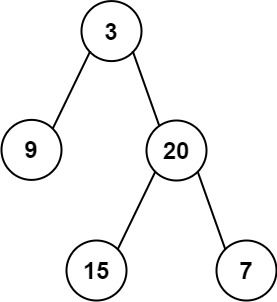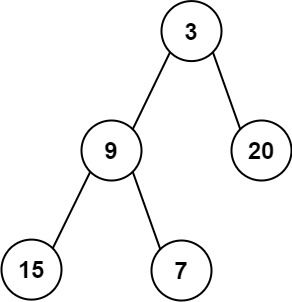Welcome to Subscribe On Youtube
637. Average of Levels in Binary Tree
Description
Given the root of a binary tree, return the average value of the nodes on each level in the form of an array. Answers within 10-5 of the actual answer will be accepted.
Example 1:

Input: root = [3,9,20,null,null,15,7] Output: [3.00000,14.50000,11.00000] Explanation: The average value of nodes on level 0 is 3, on level 1 is 14.5, and on level 2 is 11. Hence return [3, 14.5, 11].
Example 2:

Input: root = [3,9,20,15,7] Output: [3.00000,14.50000,11.00000]
Constraints:
- The number of nodes in the tree is in the range
[1, 104]. -231 <= Node.val <= 231 - 1
Solutions
-
/** * Definition for a binary tree node. * public class TreeNode { * int val; * TreeNode left; * TreeNode right; * TreeNode() {} * TreeNode(int val) { this.val = val; } * TreeNode(int val, TreeNode left, TreeNode right) { * this.val = val; * this.left = left; * this.right = right; * } * } */ class Solution { public List<Double> averageOfLevels(TreeNode root) { List<Double> ans = new ArrayList<>(); Deque<TreeNode> q = new ArrayDeque<>(); q.offer(root); while (!q.isEmpty()) { int n = q.size(); long s = 0; for (int i = 0; i < n; ++i) { root = q.pollFirst(); s += root.val; if (root.left != null) { q.offer(root.left); } if (root.right != null) { q.offer(root.right); } } ans.add(s * 1.0 / n); } return ans; } } -
/** * Definition for a binary tree node. * struct TreeNode { * int val; * TreeNode *left; * TreeNode *right; * TreeNode() : val(0), left(nullptr), right(nullptr) {} * TreeNode(int x) : val(x), left(nullptr), right(nullptr) {} * TreeNode(int x, TreeNode *left, TreeNode *right) : val(x), left(left), right(right) {} * }; */ class Solution { public: vector<double> averageOfLevels(TreeNode* root) { queue<TreeNode*> q{ {root} }; vector<double> ans; while (!q.empty()) { int n = q.size(); long long s = 0; for (int i = 0; i < n; ++i) { root = q.front(); q.pop(); s += root->val; if (root->left) q.push(root->left); if (root->right) q.push(root->right); } ans.push_back(s * 1.0 / n); } return ans; } }; -
# Definition for a binary tree node. # class TreeNode: # def __init__(self, val=0, left=None, right=None): # self.val = val # self.left = left # self.right = right class Solution: def averageOfLevels(self, root: Optional[TreeNode]) -> List[float]: q = deque([root]) ans = [] while q: s, n = 0, len(q) for _ in range(n): root = q.popleft() s += root.val if root.left: q.append(root.left) if root.right: q.append(root.right) ans.append(s / n) return ans -
/** * Definition for a binary tree node. * type TreeNode struct { * Val int * Left *TreeNode * Right *TreeNode * } */ func averageOfLevels(root *TreeNode) []float64 { q := []*TreeNode{root} ans := []float64{} for len(q) > 0 { n := len(q) s := 0 for i := 0; i < n; i++ { root = q[0] q = q[1:] s += root.Val if root.Left != nil { q = append(q, root.Left) } if root.Right != nil { q = append(q, root.Right) } } ans = append(ans, float64(s)/float64(n)) } return ans } -
/** * Definition for a binary tree node. * function TreeNode(val, left, right) { * this.val = (val===undefined ? 0 : val) * this.left = (left===undefined ? null : left) * this.right = (right===undefined ? null : right) * } */ /** * @param {TreeNode} root * @return {number[]} */ var averageOfLevels = function (root) { let q = [root]; let ans = []; while (q.length) { const n = q.length; let s = 0; for (let i = 0; i < n; ++i) { root = q.shift(); s += root.val; if (root.left) { q.push(root.left); } if (root.right) { q.push(root.right); } } ans.push(s / n); } return ans; }; -
// Definition for a binary tree node. // #[derive(Debug, PartialEq, Eq)] // pub struct TreeNode { // pub val: i32, // pub left: Option<Rc<RefCell<TreeNode>>>, // pub right: Option<Rc<RefCell<TreeNode>>>, // } // // impl TreeNode { // #[inline] // pub fn new(val: i32) -> Self { // TreeNode { // val, // left: None, // right: None // } // } // } use std::rc::Rc; use std::cell::RefCell; use std::collections::VecDeque; impl Solution { pub fn average_of_levels(root: Option<Rc<RefCell<TreeNode>>>) -> Vec<f64> { if root.is_none() { return Vec::new(); } let mut q = VecDeque::new(); q.push_back(Rc::clone(&root.unwrap())); let mut ans = Vec::new(); while !q.is_empty() { let n = q.len(); let mut sum = 0.0; for _ in 0..n { let node = q.pop_front().unwrap(); sum += node.borrow().val as f64; if node.borrow().left.is_some() { q.push_back(Rc::clone(node.borrow().left.as_ref().unwrap())); } if node.borrow().right.is_some() { q.push_back(Rc::clone(node.borrow().right.as_ref().unwrap())); } } ans.push(sum / (n as f64)); } ans } }